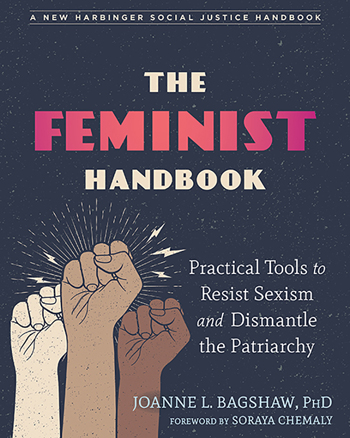By Joanne L. Bagshaw, PhD, author of The Feminist Handbook
Our culture’s obsession with thinness is pervasive and insidious. Women and girls are the primary targets of diet culture through advertising, marketing, social media, and the wellness industry—although men and boys are affected too. Diet culture is a system that values thinness over health, and unrealistic body image (think thin and curvy in all the right places). The holidays are especially triggering as we are spending a lot of time preparing, cooking, and eating with family members, some of whom we have unresolved conflicts with, and sometimes those conflicts are around food. Below are some tips to help you navigate these tricky situations, so that you can better enjoy the holidays, and enjoy eating without guilt or shame.
-
Recognize diet culture when it sneaks up on you. Notice when your Aunt Rose mentions that she’s been “good” with her diet all week so that she will deserve to splurge on today’s meal, or Uncle Gabe says he doubled up on exercise that morning so that he can eat more pie, or even when your sweet grandma asks you if you’ve lost weight, because you “look great.” Also notice when you feel guilty or anxious about eating. All these examples are red flags that the central value of diet culture—it’s better to be thin, no matter what—is at play. Take a deep breath and…
-
Remember that food doesn’t have a moral value. The idea that there are “good” and “bad” and even “clean” foods stems directly from diet culture. Even expressions such as, “You are what you eat” or “cheat meals” are from diet culture. More importantly, you do not have more or less value based on the food that you eat, or what size your body is. The more you challenge your automatic beliefs about what you consider “healthy” food, the easier it will be to trust your own judgement about what food is healthy for you.
-
Remember that our bodies are meant to change, and we’re not all supposed to look the same. Since we are inundated with messages on the hyperideal body, it takes conscious effort to remember that we’re not all supposed to be thin (and curvy). Realistically, wouldn’t it be strange if we all looked alike? Genetics, ethnicity, and environment all play a role in our body size and set point. Your set point is the weight range that your body maintains naturally, when you’re living your life and not restricting food. Additionally, it’s normal and natural for our weight to fluctuate daily, and over time. Weight change is normal, but punishing ourselves through food restriction and over-exercise is learned behavior that is reinforced by a culture that tells us to feel shame when we can’t live up to an unrealistic body ideal.
-
Set boundaries. Boundaries are limits that separate your needs from others. You can set boundaries directly, and in the moment by saying something like: “I don’t want to discuss diets at Thanksgiving dinner.” Or, “Please don’t discuss diets or put values on food around my daughter; I don’t want her to internalize negative messages around food and her body image.” You can also set boundaries by walking away from or not participating in diet culture-laden conversations. Setting boundaries helps you to create and shape the environment that you live in.
-
Acknowledge and work on your own fat phobia. Weight stigma is rooted in racism and classism from the nineteenth and twentieth century, when our culture began to value the body type of wealthy European white males. We learned to believe that thinness was a marker for class and willpower, and to stigmatize anyone who didn’t live up to these ideals—and most of us have internalized this stigma and shame. It may feel like a tall order to learn to love and appreciate your body before the next holiday meal, but you can learn to at least feel neutral about your body, or even start with a part of your body.
Joanne L. Bagshaw, PhD, is an award-winning professor of psychology and women’s studies at Montgomery College. She is also an ASSECT-certified sex therapist with a private practice in Maryland, where she lives with her husband and daughter. Joanne writes the popular feminist blog, The Third Wave for Psychology Today.



 2024 Peace Playbook: 3 Tactics to Avoid Clashes with Your Partner
2024 Peace Playbook: 3 Tactics to Avoid Clashes with Your Partner